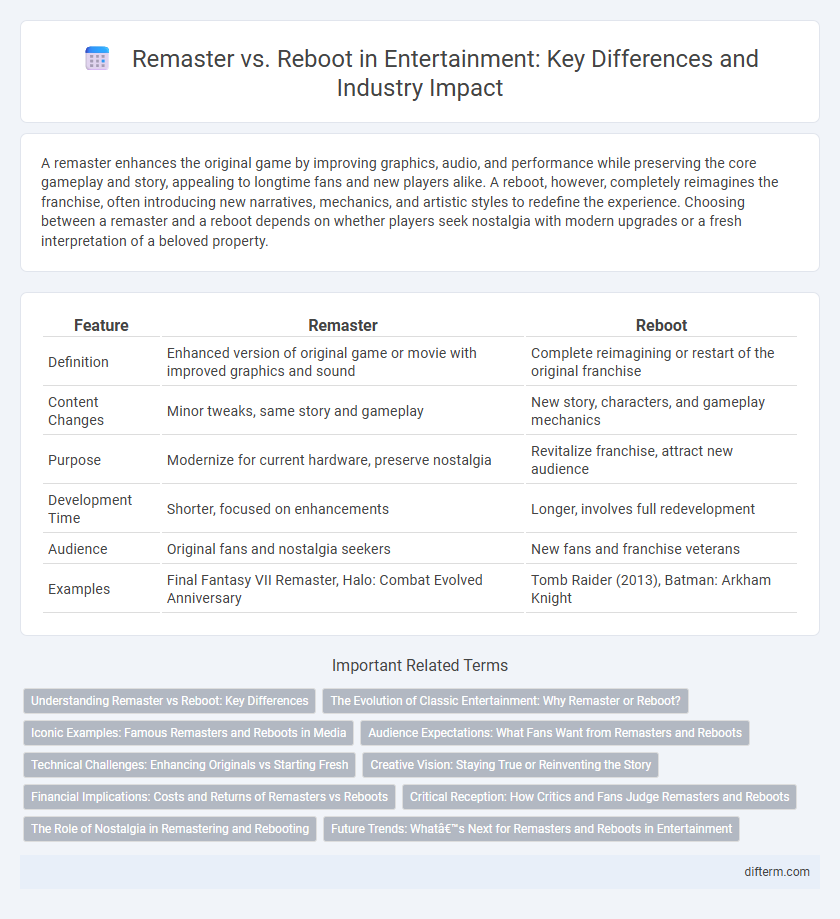A remaster enhances the original game by improving graphics, audio, and performance while preserving the core gameplay and story, appealing to longtime fans and new players alike. A reboot, however, completely reimagines the franchise, often introducing new narratives, mechanics, and artistic styles to redefine the experience. Choosing between a remaster and a reboot depends on whether players seek nostalgia with modern upgrades or a fresh interpretation of a beloved property.
Table of Comparison
| Feature | Remaster | Reboot |
|---|---|---|
| Definition | Enhanced version of original game or movie with improved graphics and sound | Complete reimagining or restart of the original franchise |
| Content Changes | Minor tweaks, same story and gameplay | New story, characters, and gameplay mechanics |
| Purpose | Modernize for current hardware, preserve nostalgia | Revitalize franchise, attract new audience |
| Development Time | Shorter, focused on enhancements | Longer, involves full redevelopment |
| Audience | Original fans and nostalgia seekers | New fans and franchise veterans |
| Examples | Final Fantasy VII Remaster, Halo: Combat Evolved Anniversary | Tomb Raider (2013), Batman: Arkham Knight |
Understanding Remaster vs Reboot: Key Differences
A remaster enhances the original game's graphics, audio, and performance while preserving its core content and gameplay, targeting nostalgia with improved quality. A reboot, however, reimagines the franchise by redesigning characters, storylines, and mechanics, often aiming to attract new audiences and redefine the series' identity. Understanding these distinctions helps fans appreciate whether a title offers a faithful upgrade or a fresh creative experience.
The Evolution of Classic Entertainment: Why Remaster or Reboot?
Remasters enhance classic entertainment by improving audiovisual quality and preserving original content, appealing to nostalgic fans while attracting new audiences through modernized presentation. Reboots reinvent franchises with fresh narratives and contemporary themes, allowing creators to reimagine characters and storylines for current market trends. Both strategies sustain the cultural relevance of iconic works, leveraging advances in technology and shifting audience expectations to revitalize legacy properties.
Iconic Examples: Famous Remasters and Reboots in Media
Famous remasters like "The Legend of Zelda: Ocarina of Time 3D" and "Final Fantasy VII Remake" preserve original gameplay while enhancing graphics and audio quality, appealing to nostalgic fans. Iconic reboots such as "Batman Begins" and "Mad Max: Fury Road" reinvent classic franchises with new storylines and modernized characters, often attracting a broader audience. These examples highlight how remasters maintain legacy content, whereas reboots offer fresh narratives to rejuvenate established titles in entertainment media.
Audience Expectations: What Fans Want from Remasters and Reboots
Fans expect remasters to preserve the original gameplay and story while enhancing graphics and performance to match modern standards, ensuring nostalgia is maintained. Reboots are anticipated to offer fresh narratives or reimagined characters, appealing to both new audiences and longtime fans looking for innovation. Maintaining the core essence of the franchise while improving user experience and storytelling is crucial for satisfying diverse audience expectations.
Technical Challenges: Enhancing Originals vs Starting Fresh
Remastering involves enhancing original game assets through higher-resolution textures, improved lighting, and updated audio while preserving core gameplay, posing challenges in balancing modern quality with nostalgic authenticity. Rebooting requires rebuilding from scratch, allowing for cutting-edge graphics and mechanics but introducing complexities in redesigning narrative and gameplay to meet current audience expectations. Technical hurdles in remasters center on compatibility and optimization of legacy code, whereas reboots demand extensive development resources and innovation for a fresh experience.
Creative Vision: Staying True or Reinventing the Story
Remasters preserve the original creative vision by enhancing visuals and audio while maintaining the core storyline, appealing to fans who value authenticity. Reboots reinvent the story, offering fresh narratives and modern interpretations that can attract new audiences and reflect contemporary themes. The choice between remaster and reboot depends on whether the goal is to honor the original artistic intent or to innovate and expand the universe.
Financial Implications: Costs and Returns of Remasters vs Reboots
Remasters typically involve lower production costs than reboots, allowing studios to capitalize on nostalgia with minimal financial risk while generating steady returns through updated graphics and compatibility with modern platforms. Reboots demand significantly higher investment due to new storytelling, design, and technology development but offer the potential for substantial revenue growth by attracting both longtime fans and new audiences. The financial implications weigh cost-efficiency against market expansion opportunities, influencing studio decisions depending on franchise strength and audience demand.
Critical Reception: How Critics and Fans Judge Remasters and Reboots
Critics often evaluate remasters based on their ability to preserve original gameplay while enhancing visuals and audio, with positive reception tied to faithful improvements that respect the source material. Fans tend to appreciate remasters for nostalgia and improved performance but may criticize them if changes feel superficial or overly commercialized. Reboots receive mixed reactions as they can revitalize franchises with new stories and mechanics, yet risk alienating long-time fans if they stray too far from beloved elements.
The Role of Nostalgia in Remastering and Rebooting
Nostalgia plays a crucial role in both remastering and rebooting entertainment content by reconnecting audiences with beloved franchises through updated visuals and gameplay while preserving original story elements. Remasters often target long-time fans by enhancing graphics and audio fidelity, maintaining the core experience that sparked initial emotional attachment. Reboots leverage nostalgia to draw attention but introduce fresh narratives or redesigned characters to engage new and returning audiences alike.
Future Trends: What’s Next for Remasters and Reboots in Entertainment
Future trends in entertainment indicate a growing blend of remasters and reboots leveraging advanced technologies such as AI-driven graphics enhancement and immersive VR experiences to revive classic titles. Studios increasingly prioritize fan engagement by integrating community feedback and expanding narrative universes through episodic content and cross-platform storytelling. The shift towards cloud gaming and interactive media promises a dynamic evolution in how remastered and rebooted content is delivered and experienced.
Remaster vs reboot Infographic

 difterm.com
difterm.com